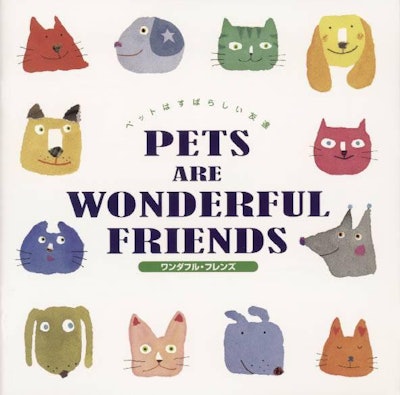
The Japanese market for US-made dog and cat food, according to US government trade statistics, ranks as the nation's second-largest export market, behind Canada. In 2005, US petfood companies shipped almost US$200 million worth of dog and cat food to Japan. This is why, for the past 13 years, the Pet Food Institute (PFI) has been actively training Japanese veterinarians on the advances in pet nutrition and working to teach Japanese pet owners about the importance of feeding the country's 12.1 million pet dogs and 8.5 million pet cats a complete and balanced petfood diet.
PFI's marketing program representative in Japan, Yuko Adachi, explains the importance of the market and the veterinary education seminars: "The pet boom in Japan has continued for close to a decade and has gained even more momentum in the last few years. However, Japanese veterinarians and many pet owners still need more information about nutrition for small animals, with only a handful of veterinarians having specialized knowledge about nutrition." The seminars that PFI sponsors every year are designed to provide nutrition-specific training to Japanese veterinarians so they can go on to educate pet owners through their practice.
PFI teaches veterinarians
This past March, PFI had the opportunity to continue its program of veterinary education by conducting two seminars: one in Tokyo, and one at the annual meeting of the Japan Veterinary Medical Association in Tsukuba, a suburb two hours outside the capital city.
Speaking on behalf of PFI was Dr. Kathryn Michel, a veterinarian and professor at the University of Pennsylvania Veterinary Hospital in Philadelphia, Pennsylvania, USA. PFI's work in Japan is funded by the USDA Foreign Agricultural Services' Market Access Program, a grant program designed to expand export opportunities for US petfood companies. In previous program years, Dr. Michel has made presentations on behalf of PFI at veterinary seminars in Mexico and in China.
At the first seminar, Dr. Michel shared the latest research on treating diabetes in dogs and cats with the 50 veterinarians in attendance. Stressing the importance of nutritional treatments for diabetic pets and good body condition scores for all pets, Dr. Michel gave the veterinarians a primer in steps they can use in their practices to help treat, and hopefully prevent, the disease. Dr. Michel's presentation was followed by a brief lecture on critical diabetes care from PFI's spokesperson in Japan, Dr. Toshinori Sako.
Dr. Michel was pleased to see the level of care Japanese pet owners take with their pets. "The Japanese clearly cherish their pets and want the best care possible for them," she said, concluding her presentation.
Second verse
After a short journey to the Tokyo suburb of Tsukuba, PFI conducted its second, much larger veterinary seminar at the annual meeting of the Japan Veterinary Medical Association (JVMA). PFI was the first outside organization accepted to present at the JVMA's annual meeting. In this course, Dr. Michel focused on long-term dietary effects and attracted well over 100 practicing veterinarians and students.
Titled "Feeding Pets for Health and Longevity: What Really Counts," this seminar focused on showing veterinarians the best ways to communicate with their clients to ensure pets receive optimal nutrition, while avoiding the negative health effects of obesity. Since Japan has an aging pet (as well as human) population, the weight gain sometimes associated with getting older is of paramount concern to Japanese veterinarians. By teaching veterinarians about proper pet diet and body condition, they in turn can educate their clients, spreading PFI's message of proper pet care through good nutrition.
Following her talk at the JVMA meeting, Dr. Michel commented: "This was my second opportunity to speak to veterinarians in Japan and, other than language, which was much more an issue for me than my audience, I was again struck by similarities between US and Japanese veterinarians in their knowledge and expertise in companion animal medicine."
Outreach efforts
The sharing of this knowledge is but one facet of the overall PFI program used in Japan and a variety of other markets including China, Russia, Mexico and parts of Central and South America. The success of the program in Japan was demonstrated following the discovery of the first US case of BSE in December 2003. Though the Japanese government imposed a ban on imports of US beef and a cautionary label on domestically-made petfood, US-made petfood products were not negatively impacted.
"The technical support and assurance regarding transmissible spongiform encephalopathies (TSEs) and dogs and cats given by PFI have helped the Japanese government cope with the BSE outbreak in their country and have maintained the strength of Japanese, as well as US, ruminant-based petfood products in the marketplace," said Nancy K. Cook, PFI's vice president of Technical and Regulatory Affairs. "The relationships and contacts developed through our market programs are invaluable in addressing trade disruptions," she added. As a result, Japan continues to rank as the second largest market for US-made petfood, after Canada.
The love of pet dogs and cats in Japan shows no signs of subsiding. As in the US, the aging population has relied on pets for love and companionship. Young adults, sometimes living alone in large metropolitan areas, have also discovered the joy of a four-legged "friend." PFI is proud to help Japanese pet owners care for their pets, and as the program declares, teach everyone in Japan that pets are "wonderful friends."












